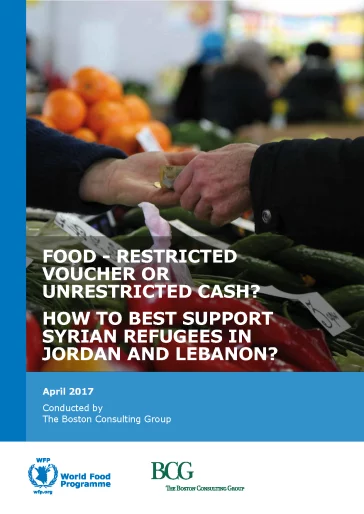Food – Restricted Voucher or Unrestricted Voucher Cash? How to Best Support Syrian Refugees in Jordan and Lebanon?
The World Food Programme (WFP) plays a pivotal role in the food security of Syrian refugees within the Syria +5 region. WFP periodically reviews its operational approach, so it is timely to consider what the best modality for the next phase of the response might be, including the pros and cons of delivering assistance through unrestricted cash as opposed to food-restricted value vouchers electronically redeemed at designated WFP-contracted retailers.
Emerging humanitarian research suggests that unrestricted cash transfers offer an effective and efficient alternative to value vouchers for refugees in host communities. Recently, several international agencies delivered cash assistance in Jordan and Lebanon and reported positive results. Some of WFP’s key donors have expressed a strong inclination toward food assistance in the form of unrestricted cash, whereas others favor food-restricted value vouchers.
This study focused on beneficiaries living in host communities. Those living in refugee camps were excluded. Therefore, results and conclusions reported here reflect this sampling decision. They are representative for Syrian refugees in host community settings in Jordan and Lebanon but may not be fully representative of refugees in camps. The findings may well be applicable in comparable contexts and middle-income countries with functioning markets, but they may not necessarily apply in a very different refugee-host combination, such as in locations with limited market functionality, failed states, or situations where there are food shortages.
This study’s objective was to compare the impact of WFP’s assistance-delivery modality, whether unrestricted cash or food-restricted value voucher, on (1) food security and other basic needs of beneficiaries and (2) the program’s cost effectiveness for WFP. In this study, use of cash was unrestricted; the beneficiaries could spend it freely. In contrast, the voucher option was restricted to food items at the voucher-accepting WFP-affiliated retail outlets
